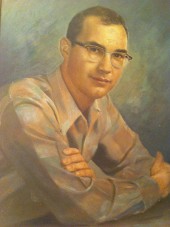 …RE: not so much personal issues as different priorities.
…RE: not so much personal issues as different priorities.
February 16, 2011.
I wonder, again, if the media might have a part in the local vs. national divide. Even though I think our work did not get good national coverage, from the start it did, in a way, locally.
The first notice was the Mattachine letter to school board people—who in their right minds would start a movement and aim at the children first, instead of laws, etc.? But, as we know and forget when dealing with the bigots, just the attack by Paul Coates, et al., against Mattachine—and they sure learned of the Communist part right away—got the organization known, by people who had not heard of it by word of mouth yet. So his attack actually got new people involved.
Dale Jennings’ arrest/entrapment and the effort to fight the cops got notice in the community but not the media. And ONE magazine’s Supreme Court victory got very little notice.
But by the ’60s, we were picketing the Los Angeles Times, having a Motorcade through Los Angeles, and on five or six different TV and radio talk shows, so it would have been hard for closet queens to not know of our work.
If no media coverage was held in Houston until later, then maybe there was no new groups started, etc. And the publicity in L.A. got new people started—many we didn’t like too much, as they exploited the movement, got paid jobs with politicians, etc. And of course MCC started, and got lots of publicity when Troy Perry got interviewed by John Dart, the religion person at the Los Angeles Times when we were picketing—and the article was carried in many newspapers around the country: a gay church!
There was no competition between Mattachine and its offspring ONE, Inc., since Mattachine in L.A. died and Hal Call restarted it in San Francisco. And the “proof” that the magazine was the essential part of the early effort was the fact that he and then the DOB immediately started a magazine too. It was national, not just local, and for a while they were the only way to get movement news. And the only news of books, etc.
Even though I had never heard of any book or the idea, apparently most people think the Kinsey report and Cory’s book prepared the nation for a discussion on homosexuality. And so the timing was right. World War II sure moved people away from their old homes and small communities—and apparently even today people are still leaving the rural/small town areas.
As to conflict, it seems not so much internal as external—we now have two glbt Republican groups, two or three military groups, and I see no conflict among the several lgbt legal service organizations. I do wonder if the media covering DADT ever heard of Randy Shilts’ book, Conduct Unbecoming. Even glbt journalists don’t seem to know history and the path this and other parts of the movement have taken.
Mattachine was a great “brand.” No doubt about it—ONE is strange, not exotic. And as to our history—only three people I know of still exist who were ONE: co-founder Tony Reyes, who is not active in the movement, Jim Schneider, who was on the board of both ONE, Inc., before the division and on ONE/IGLA after the division. I am the only actual paid staff member living that I know of. And now ONE lives on as two archives/libraries, preserving our history, which is now a small part leading up to Stonewall, Lawrence vs Texas, DADT, marriage, and all the great groups working today.

